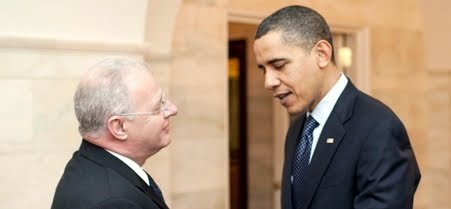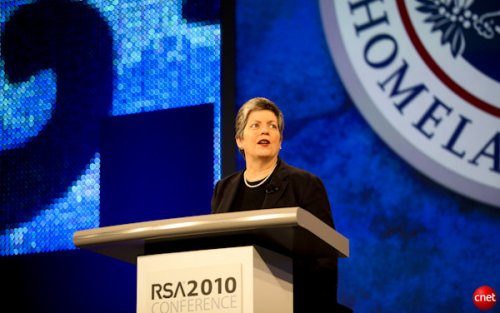« Pentagon Metro Shooter John Patrick Bedell Was a Registered Democrat | Main | NRA News: UN Doomsday Treaty »
March 06, 2010
Details of “Einstein” Cyber Shield Disclosed by White House

Cybersecurity Chief Howard Schmidt Obama's Cyber CZAR and Obama
.
Details of “Einstein” Cyber Shield Disclosed by White House
The Obama administration lifted the veil Tuesday on a highly-secretive set of policies to defend the U.S. from cyber attacks.
It was an open secret that the National Security Agency was bolstering a Homeland Security program to detect and respond to cyber attacks on government systems, but a summary of that program declassified Tuesday provides more details of NSA’s role in a Homeland program known as Einstein.
The current version of the program is widely seen as providing meager protection against attack, but a new version being built will be more robust–largely because it’s rooted in NSA technology. The program is designed to look for indicators of cyber attacks by digging into all Internet communications, including the contents of emails, according to the declassified summary.
Homeland Security will then strip out identifying information and pass along data on new threats to NSA. It will also use threat information from NSA to better identify emerging cyber attacks.
NSA’s role is a careful balance because of the political battles that ensued over the agency’s role in domestic surveillance in the George W. Bush administration. Declassifying details of the NSA’s role, in a program initially developed during the Bush administration and continued in the Obama administration, will likely ignite new debates over privacy.
The White House’s new cyber-security chief, Howard Schmidt, announced the move to declassify the program in a speech at the RSA conference in San Francisco–his first major public address since assuming the post in January. He said addressing potential privacy concerns was one of the ten initial steps he planned to take. “We’re really paying attention, and we get it,” he said.
.

Homeland Security Secretary Janet Napolitano, who said that Einstein 3 could only be discussed in a classified setting, speaks at the RSA conference on Wednesday.
Feds weigh expansion of Internet monitoring
CNET
Homeland Security and the National Security Agency may be taking a closer look at Internet communications in the future.
The Department of Homeland Security's top cybersecurity official told CNET on Wednesday that the department may eventually extend its Einstein technology, which is designed to detect and prevent electronic attacks, to networks operated by the private sector. The technology was created for federal networks.
Greg Schaffer, assistant secretary for cybersecurity and communications, said in an interview that the department is evaluating whether Einstein "makes sense for expansion to critical infrastructure spaces" over time.
Not much is known about how Einstein works, and the House Intelligence Committee once charged that descriptions were overly "vague" because of "excessive classification." The White House did confirm this week that the latest version, called Einstein 3, involves attempting to thwart in-progress cyberattacks by sharing information with the National Security Agency.
Greater federal involvement in privately operated networks may spark privacy or surveillance concerns, not least because of the NSA's central involvement in the Bush administration's warrantless wiretapping scandal. Earlier reports have said that Einstein 3 has the ability to read the content of emails and other messages, and that AT&T has been asked to test the system. (The Obama administration says the "contents" of communications are not shared with the NSA.)
"I don't think you have to be Big Brother in order to provide a level of protection either for federal government systems or otherwise," Schaffer said. "As a practical matter, you're looking at data that's relevant to malicious activity, and that's the data that you're focused on. It's not necessary to go into a space where someone will say you're acting like Big Brother. It can be done without crossing over into a space that's problematic from a privacy perspective."
Homeland Security Secretary Janet Napolitano stressed the need for more cooperation between the government and the private sector on cybersecurity, saying that "we need to have a system that works together."
During a House appropriations hearing on February 26, Napolitano refused to discuss Einstein 3 unless the hearing were closed to the public. "I don't want to comment publicly on Einstein 3, per se, here in an unclassified setting," she said. "What I would suggest, perhaps, is a classified briefing for members of the subcommittee who are interested."
Some privacy concerns about Einstein have popped up before. An American Bar Association panel said this about Einstein 3 in a September 2009 report: "Because government communications are commingled with the private communications of non-governmental actors who use the same system, great caution will be necessary to insure that privacy and civil liberties concerns are adequately considered."
Jacob Appelbaum, a security researcher and programmer for the Tor anonymity project, said that expanding Einstein 3 to the private sector would amount to a partial outsourcing of security. "It's clearly a win for people without the security know-how to protect their own networks," Appelbaum said. "It's also a clear loss of control. And anyone with access to that monitoring system, legitimate or otherwise, would be able to monitor amazing amounts of traffic."
Einstein grew out of a still-classified executive order, called National Security Presidential Directive 54, that President Bush signed in 2008.
While little information is available, former Homeland Security Secretary Michael Chertoff once likened it to a new "Manhattan Project," and the Washington Post reported that the accompanying cybersecurity initiative represented the "single largest request for funds" in last year's classified intelligence budget. The Electronic Privacy Information Center has filed a lawsuit (PDF) to obtain the text of the order.

Wild Thing's comment.......
All of this about reading emails but they won't guard the borders????
...Disclosed by White House...
Anyone else think that if you were trying to protect the Country from threats it might not be a good idea to disclose what you're doing? Just the fact that we have such a program and some rough characteristics of it is valuable intel. That it is far enough along that the top suits feel safe in talking about it tells you something too.
 ....Thank you Mark for sending this to me.
....Thank you Mark for sending this to me.
Mark
3rd Mar.Div. 1st Battalion 9th Marine Regiment
1/9 Marines aka The Walking Dead
VN 66-67
Posted by Wild Thing at March 6, 2010 04:49 AM
Comments
Get that f'kin melon gunny!!!
Posted by: Jack at March 6, 2010 11:57 AM
I can't imagine Janet Incompitano running anything except a Juice blender. Let alone a government department in charge of Securing the country.
When it comes to Einstein they are in way over their heads. They can't even add and subtract, I mean look at their numbers for the budget, they are happy with 36,000 more people unemployed. These people are the most incompetent bunch we have ever had in the White house.
Posted by: Mark at March 6, 2010 12:40 PM
Jack, ditto that.
Mark, LOL good name for her. I agree with you about Einstein and how they are in over their heads too.
Posted by: Wild Thing at March 6, 2010 07:44 PM
